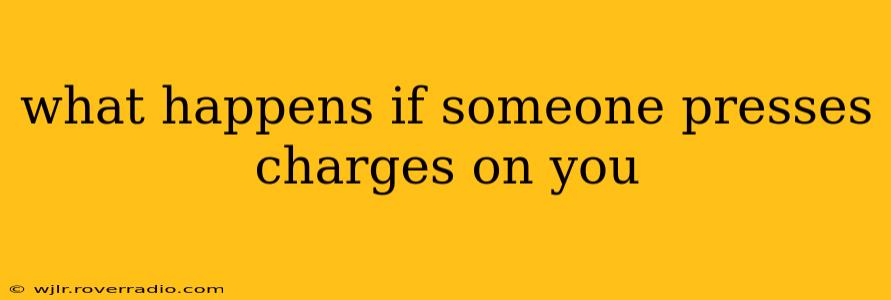What Happens if Someone Presses Charges Against You?
Facing criminal charges can be a daunting experience, filled with uncertainty and anxiety. Understanding the process is crucial, and this guide will walk you through the potential steps involved when someone presses charges. Remember, this is general information, and the specifics can vary significantly depending on the jurisdiction, the severity of the alleged crime, and the specific circumstances of the case. It's crucial to seek legal counsel immediately if you are facing charges.
What Does "Pressing Charges" Actually Mean?
The term "pressing charges" is often used colloquially. In reality, the process isn't as simple as one person deciding to file charges against another. Typically, a law enforcement agency investigates an alleged crime, gathers evidence, and then determines whether or not to arrest and charge an individual. The alleged victim's statement is a significant piece of evidence, but it's not the sole determinant of whether charges are filed. The police and the prosecutor's office will assess the evidence to determine if there is enough probable cause to support criminal charges.
What Happens After Charges Are Filed?
Once charges are filed, the process generally proceeds as follows:
-
Arrest (if applicable): Depending on the severity of the crime and the circumstances, you might be arrested and taken into custody. This could involve being booked, fingerprinted, and photographed. You may also be required to post bail to be released pending trial.
-
Arraignment: This is your first court appearance. You'll be formally informed of the charges against you and will be asked to enter a plea (guilty, not guilty, or no contest). You will have the opportunity to consult with an attorney.
-
Discovery: Both the prosecution and the defense gather and exchange evidence relevant to the case.
-
Plea Bargaining: In many cases, the prosecution and defense will attempt to negotiate a plea bargain. This involves agreeing to a lesser charge or sentence in exchange for a guilty plea.
-
Trial (if a plea bargain isn't reached): If a plea agreement isn't reached, the case will proceed to trial. This involves presenting evidence, calling witnesses, and having a judge or jury determine guilt or innocence.
-
Sentencing (if found guilty): If you are found guilty, the court will impose a sentence, which could include fines, probation, community service, or imprisonment.
What if I'm Innocent?
If you believe you are innocent, it's crucial to:
- Remain silent: Do not talk to the police without an attorney present. Anything you say can be used against you.
- Hire an attorney immediately: A lawyer can protect your rights, advise you on the best course of action, and represent you in court.
- Gather your own evidence: If you have evidence that supports your innocence, such as witnesses or documentation, collect and preserve it carefully.
How Serious are the Charges?
The severity of the charges significantly impacts the process. A misdemeanor will generally lead to less severe penalties than a felony. The type of crime significantly determines the potential consequences.
What About Civil Suits?
It's important to note that criminal charges are separate from civil lawsuits. Even if criminal charges aren't filed, the alleged victim could still sue you in civil court for damages.
Can Charges Be Dropped?
Yes, charges can be dropped for various reasons, including insufficient evidence, witness unavailability, or prosecutorial discretion. However, this doesn't guarantee the case won't be reopened later if new evidence emerges.
Disclaimer: This information is for educational purposes only and should not be considered legal advice. If you are facing criminal charges, it's crucial to seek the advice of a qualified attorney in your jurisdiction.
